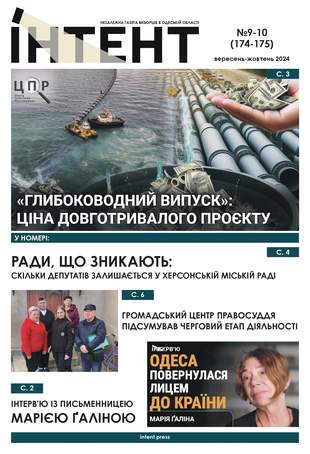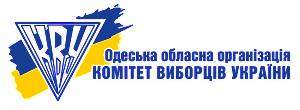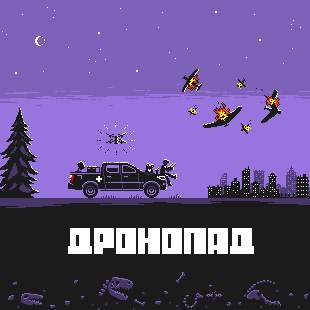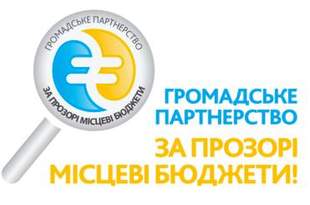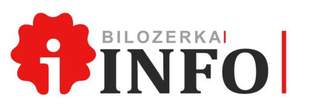Nov. 25, 2024, 9:16 p.m.
"Half of us are tired of sympathizing with others": discussion on burnout with the participation of Henry Marsh
Цей матеріал також доступний українською47
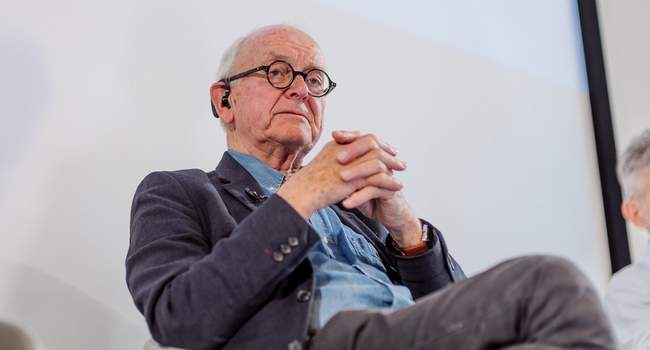
Henry Marsh. Photo: Odrex Medical Hub
A panel discussion "Humanity and Progress in Medicine" was held in Odesa with the participation of British neurosurgeon and famous writer Henry Marsh. The main topics for discussion were burnout in medicine and how the environment affects recovery. The discussion was also attended by Andriy Myzak, a leading neurosurgeon and translator of Henry Marsh's books into Ukrainian, Dmytro Havrychenko, an anesthesiologist, medical director of Odrex, professor of the Department of Anesthesiology, Intensive Care and Emergency Medicine at ONMedU, and Maksym Mykhalochkin, a member of Odesa Business Club, founder of Transmet UA LLC and TIM LLC. Below is the live speech of a part of the discussion.
Watch the full version of the discussion on Intent's YouTube channel.
D.G.: About burnout in specialties. I would also like to say that according to this study, the fatigue of empathizing with others has increased significantly. This is 52%. That is, half of us are tired of sympathizing with others. This study also shows that doctors do not receive enough emotional support. This is about colleagues, relatives, our loved ones. And it is very important for us that nurses receive even less emotional support. And this is all about burnout. Because you and I can see a patient during a consultation, a surgical intervention. But then after that, in the intensive care unit or in the ward, a nurse spends much more time with them. And this staff also needs attention, they also burn out.
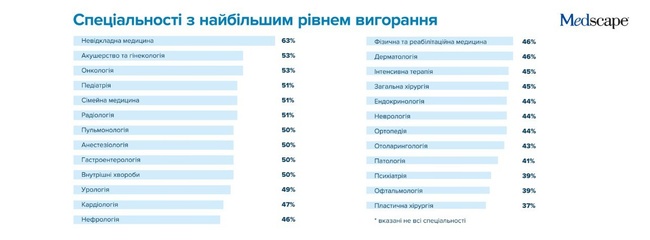
Medical specialties with the highest burnout rates. Infographic: Medscape
G.M.: In England, a study was conducted on PTSD counseling. Afterwards, the level of anxiety was higher than in people who did not receive counseling. If you come to a person and say that they must be very anxious or feel bad, their anxiety will increase. As we always say, balance is important here. A few years ago, in a lecture in Houston and during a meeting of the heads of 125 neurosurgery programs in America, one of those American professors showed us a slide. And on the vertical axis was the percentage of doctors who reported burnout. And on the horizontal axis was the percentage of doctors who were dissatisfied with their work-life balance. And this applied to many medical specialties. And in almost all medical specialties, there was a straight line. The less satisfied you are with your work-life balance, the more burnout you experience. With two exceptions: emergency medicine, they were very satisfied with their work-life balance, but felt terribly burned out. And neurosurgeons were very dissatisfied with their work-life balance, but they didn't have burnout at all. There may be many explanations for this. But emergency room workers don't have that kind of satisfaction, they can't see cured patients. They do urgent cases and pass patients on to the next destination. Seeing your patients recover is the reward that makes this profession such a miracle.
A.M.: I, like Dr. Marsh, do not belong to the sect of believers in burnout syndrome. And just finally, listening to Dr. Marsh, I realized that I can't say much about burnout syndrome because I've never had it in my life in my 30 years of practice. And finally, I realized why it is so good for a doctor not to hide his or her cell phone from the patients you treat and to maintain a relationship with them for a longer time after treatment. Then the doctor has the privilege of finding out how his patients feel after treatment and learning about the real results of his efforts. There is nothing better in medicine, as Henry says, than to know that your treatment, your efforts, your attempts, your work saved a person, and they are very grateful to you. We are turning again, perhaps, to empathy, right? The best way to protect yourself and never have burnout syndrome in your life is to be with your patients. You have to be open, no matter how trite it may sound, and love people. Yesterday or the day before, listening to Dr. Marsh talk with someone else, I heard that you can leave, say, your clinic and say, oh my God, I saw ten people today, how they bore me, how they are all boring. Or you can listen to 10 stories about life, 10 narratives, unique episodes, unique characters. You just have to be curious and open-minded, and you won't have burnout syndrome. I just told you a recipe for a dish that I have never cooked because I don't have burnout syndrome.
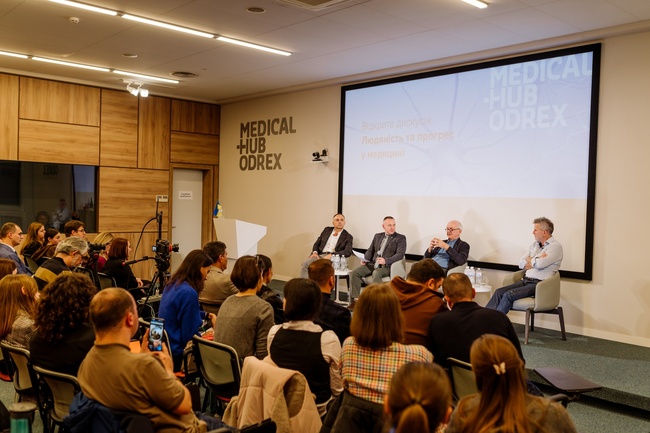
Photo: Medical Hub Odrex
M.M.: It's hard for me to add anything about burnout in medicine because I don't have such experience. But I liked the thoughts about the balance between work and family, rest. I think it changes throughout life. At the beginning, people don't think about this balance, they think about how to get the fastest results, they try to grab it. In terms of burnout, I think it's just my feeling, I understand what it's like when you're creative, when you create something. That is, you don't burn out when your service or if you produce a product, your product, is in demand, you understand your ultimate beneficiary, and you see how it worked, how it is in demand, and that's the greatest satisfaction. It's actually worth more than the money, and that's what gives you energy and gives you the strength to move on, that's what keeps you going, and then there's no burnout.
D.G.: I'm going to share with you a story not about telling off, but very close to the fact that we need to know what will happen to our patients afterwards. And the more information we learn from these patients, the easier it will be for us to bear all the burdens of our work. Many years ago, we worked at the Department of Anesthesiology and were engaged in hemostasis. This was our scientific topic, we studied it, made scientific reports, wrote dissertations on it. We did this with Serhiy, who is in the audience. We had one pregnant woman who came to us, she couldn't get pregnant for a long time. All the obstetricians said she would miscarry. Then our head prescribed her anticoagulants for the entire pregnancy. And we were monitoring her, doing tests to control her hemostasis. And then somewhere in the late stages, we lost track of her. And that was literally 8-10 years ago. And it was literally there a year ago that I found her by accident, but I found her on Facebook and saw her with an eight-year-old child. I found her contact, called her, and I felt very cool emotions. This is the result of our work, our science. It is very difficult in Ukraine, not easy. And I felt the satisfaction that we are doing something right. And this is very important. And then we will never feel any burnout when we know that our patients are fine and we have succeeded. So be in touch with your patients.
Comment from the audience: I believe that in order not to burn out at work, there should be a clear separation of work and personal life. Because, for example, if I am on vacation, or on weekends, or in one evening patients start to bother me very much, I will start to burn out. We will never be able to avoid it, but I believe that it should be as little as possible. Likewise, if I am at work from 08:00 to 17:00 and at that time my wife starts calling me with some household issues, with lists of what to buy for the evening, or with some scandals, I will burn out in the same way. This is my personal opinion.
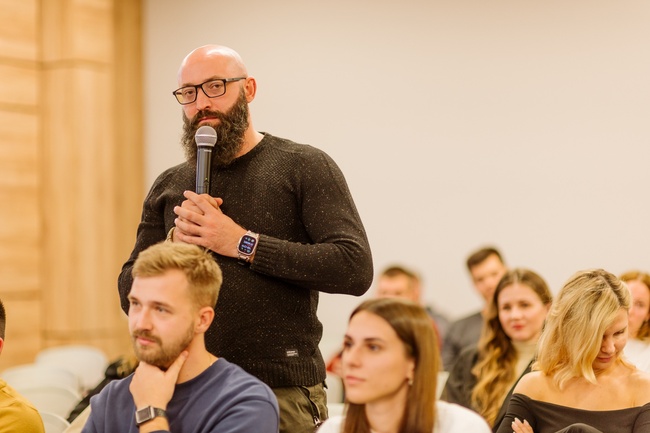
Photo: Medical Hub Odrex
What should experienced and young doctors who, back in the days of covid, sympathized a lot with patients and left medicine when they were burned out, do?
D.G.: Return to medicine. What do you have to do? Gather strength and return to medicine. You know, our founders say this phrase:"We need to talk". And this is a very simple message, a simple thing. We have to talk. We have to talk to our colleagues, we have to talk to our families, share our situations. And it definitely helps. It helps 100%. And one more important point. Andriy said that he never burns out and doesn't know what it is. I understand him, but...
A.M.: I am a typical neurosurgeon. I'm very dissatisfied with my life balance.
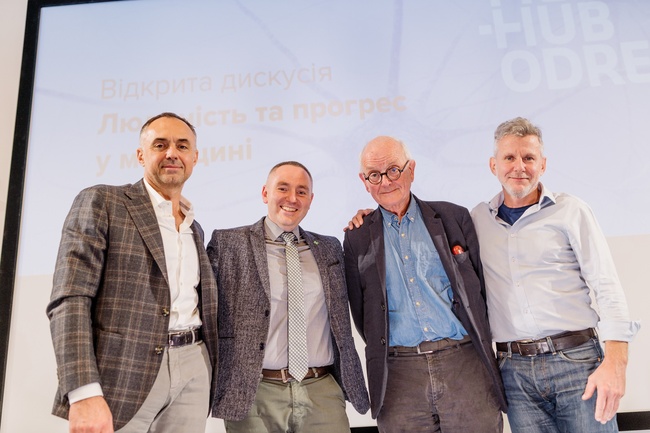
Photo: Medical Hub Odrex
D.G.: But we as doctors, and as heads of departments, or managers, we have to remember that the people who work with us, they can burn out. And we should probably show empathy for them and talk to them about it. Because I realized this not so long ago. When you see your colleagues no longer understand what is going on with this patient, or what they are going through in this situation, you realize that yes, this exists, and we have to remember it. If we don't have it, then we have to understand that our colleagues may have this problem. This is part of empathy.




